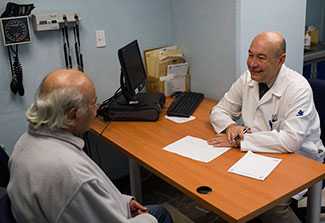New grants will help develop expertise in research ethics
July / August 2016 | Volume 15, Number 4

Photo by David Rochkind for Fogarty
Fogarty is awarding $5.3 million in grants to develop
research bioethics expertise in low- and middle-income
countries.
When health research is conducted in low- and middle-income countries (LMICs), there are unique ethical considerations, given that many study participants are poor, have limited access to health care or may be low literacy. Do they understand the trial and the risks involved? What care is being provided during and after the study? Will the research benefit the community hosting it? To equip more scientists with the expertise needed to handle those types of questions, Fogarty recently awarded four grants totaling up to $5.3 million for five years of support.
"As clinical research and trials increase in LMICs, the need for skilled local experts to independently assess and address thorny ethical issues will remain key," says Fogarty Director Dr. Roger I. Glass. "Fogarty, along with its many partners at NIH, is committed to being part of this continuing and essential process." Funding comes from the International Research Ethics Curriculum and Career Development Award program, which Fogarty launched in 2000.
Four institutions are being funded for new or ongoing training programs in the Americas, the Middle East, North Africa and sub-Saharan Africa. Graduate-level courses and other opportunities will prepare scientists, health professionals and academics who may conduct clinical research; serve on ethics review committees; develop ethics education programs at their institutions; guide ethics policies; and conduct and publish original research on ethical issues.
Harvard Medical School was awarded a new grant to build capacity in Rwanda, with the goal of achieving a self-sustaining national system of ethical review of medical research involving human subjects. Investigators will develop a curriculum and train three cohorts of researchers, educators and senior experts in ethics who will be prepared to assume leadership roles and guide policies.
A renewal award enables Dartmouth College to continue its work with Muhimbili University of Health and Allied Sciences (MUHAS) to train scientists, faculty, health care providers and other professionals in Tanzania and throughout the East Africa region. Following the successful training under the previous grant, there's now enough in-country expertise to move all training activities to MUHAS. The master's of bioethics program will be expanded, faculty will have opportunities for professional development, and a bioethics institute will be created to serve as a national and regional resource.
The Latin American University of Social Sciences (FLACSO) in Argentina will use its award to enhance the training it's been providing since 2000. The program in Buenos Aires will be expanded to train new researchers and ethics committee members for countries that lack sufficient expertise. Collaborating Centers in Mexico and Brazil will be established, along with a new mentoring program, to offer continuing education and ensure sustainability among former trainees.
The University of Maryland, Baltimore will build on the initiative it launched in the Middle East and North Africa in 2005. With the new funding, the program will focus on three countries where many former trainees are located. Blended diploma programs in research ethics will be developed at Al Neelain University in Khartoum, Sudan; online continuing medical education courses will be developed for the Egyptian Network of Research Ethics Committees; and participants at two universities in Morocco will be trained in research ethics. The program's combination of onsite and online training will continue with the addition of several new topics trainees requested, including grant and manuscript writing.
NIH's National Cancer Institute (NCI) and National Institute of Allergy and Infectious Diseases (NIAID) are helping to support some of the projects.
2016 International Research Ethics Education and Curriculum Development Awards
Access details about each of the awards from NIH RePORTER:
Dartmouth College
Dartmouth/MUHAS Research Ethics Training and Program Development for Tanzania
Contact Principal Investigator: Dr. Richard Waddell
Harvard Medical School
Development Initiative for Ethical Review and Oversight of Health Research Involving Human Subjects in Rwanda
Contact Principal Investigator: Dr. Bernard Friedland
The Latin American University of Social Sciences (FLACSO)
Training Program in Research Ethics in the Americas
Contact Principal Investigator: Dr. Florencia Luna
University of Maryland, Baltimore
Middle East Research Ethics Training Initiative (MERETI)
Contact Principal Investigators: Dr. Henry Silverman
More Information
To view Adobe PDF files,
download current, free accessible plug-ins from Adobe's website.